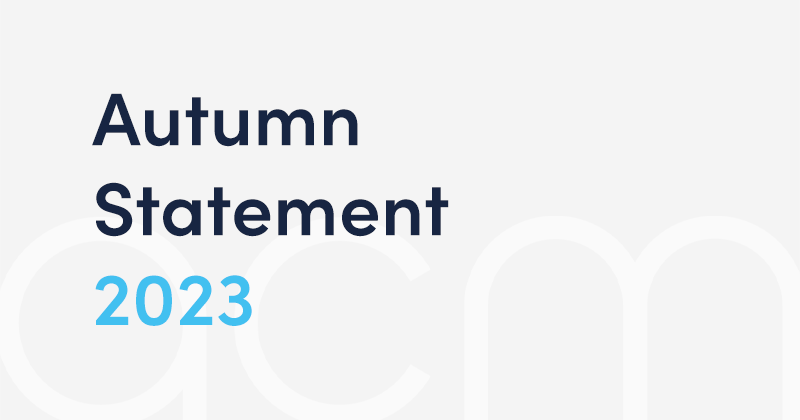
Economy and Public Finances
After hitting an all time high of 11.1% in October 2022, inflation had fallen to 4.6% in October 2023 and the Office of Budget Responsibility (OBR) is forecasting further falls in November and December with a predicted inflation rate at the end of the year of 2.9%.
The Bank of England base rate continued to rise during the year and reached 5.25% in August 2023.
There was positive news in relation to both growth in Gross Domestic Product and in government borrowing with the OBR reporting better growth and lower borrowing than expected. In March 2023 the OBR was predicting negative growth overall for the current year, but the first 3 quarters of the year have shown positive growth of 0.5%. Public Sector Net Debt as a percentage of GDP has also been lower than expected and currently stands at 97.9% of GDP (the second lowest in the G7). Total debt does, however, stand at £2.7 trillion and the forecasts indicate a continued need to borrow for each year of the forecast increasing the total debt moving forwards.
National Insurance
There had been significant speculation over a cut in National Insurance and the Chancellor didn’t disappoint by announcing a reduction to both employee National Insurance and self employed National Insurance rates.
The self employed currently pay two separate National Insurance contribution charges, being Class 2 and Class 4 contributions. Class 2 contributions will be abolished from 6 April 2024 and the main rate of Class 4 contributions will be cut from 9% to 8% from the same date.
For employees, the main rate of Class 1 contributions will drop from 12% to 10% from 6 January 2024. The main rate of Class 1 contributions is payable on earnings between £12,570 and £50,270. A rate of 2% is payable on earnings above £50,270.
Full Expensing
The Chancellor announced in March this year that a new capital allowances regime would be introduced whereby companies can deduct 100% of the cost of qualifying new plant and machinery from their profits before tax. The allowance was originally set to run for 3 years from 1 April 2023 but the Chancellor announced in the Autumn statement that this will now be a permanent allowance, making it one of the most generous capital allowance regimes in the world.
Business Rates
The Business rates multiplier is normally uprated each year by CPI. The small business multiplier in England has been frozen since 2020/21 and will continue to be frozen at 49.9p until the end of 2024/25. The standard multiplier will, however, increase by CPI to 54.6p
The current 75% business rates relief for eligible Retail, Hospitality and Leisure properties will be extended to 2024/25.
National Living Wage
The National Living Wage will increase from £10.42 to £11.44 from 1 April 2024 for individuals aged 21 and over.
Research and Development
There have been very few Autumn Statements or Spring Budgets that don’t include some form of tinkering with Research and Development (R&D) Relief.
R&D continues to be a complex area with more and more qualification requirements. The latest change sees the merger of the two R&D schemes being the Research and Development Expenditure Credit and the SME scheme. The merged scheme will apply to expenditure incurred in accounting periods beginning on or after 1 April 2024.
Construction Industry Scheme
A minor change will be introduced in the Autumn Finance Bill 2023 whereby VAT will be included in the Gross Payment Status compliance test giving HMRC more power to remove Gross Payment Status immediately in cases of fraud. The government have also announced that a technical consultation will be undertaken in relation to the simplification of other aspects of the scheme.
Expanding the Cash Basis of Accounting
Currently eligible businesses can only join the cash basis if their turnover is less than £150,000 and must leave where turnover exceeds £300,000. From 6 April 2024 the turnover restrictions will be removed in their entirety and eligible businesses of any size will be able to use the cash basis.
Eligible businesses exclude companies, property businesses, partnerships with a corporate member, limited liability partnerships and any business that has made a claim for farmers’ or artists’ averaging relief.
Annual Tax on Enveloped Developments (ATED)
The annual chargeable amounts for ATED will increase by 6.7% for the 2024/2025 ATED charging period.
Pension and Benefit increases
Universal credit and other benefits will increase by 6.7% and the standard State Pension will increase by 8.5% from 1 April 2024.
For more information please contact Amanda Gunter, Tax Partner. Amanda heads up our Tax Team and is based in our Taunton office.


